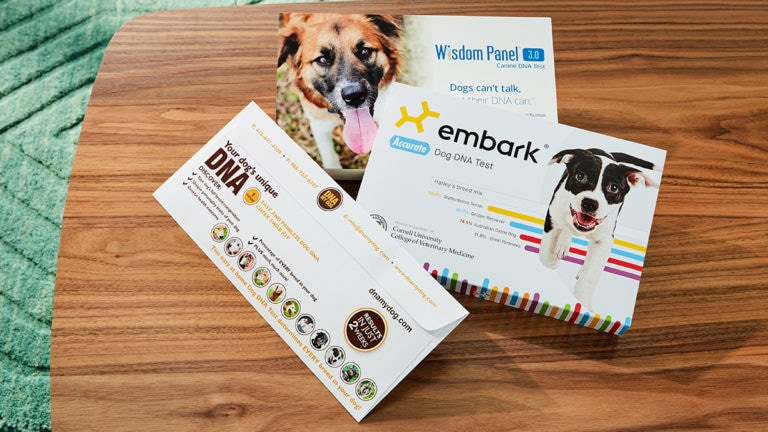My husband and I rescued our first-ever furbaby (named Roster) from the animal shelter 13 years ago. With her next birthday nearing, and her walks slowing, we’ve realized—since we don’t know her breed or genetic history—we also don’t know what medical conditions or potential health risks to expect or proactively prevent against.
Enter: pet DNA tests. Before writing this article, I knew nothing about them. What are pet DNA tests? How reliable are pet DNA tests? What do they actually reveal? So, we reached out to three of our resident Pet Health Representatives for Chewy Health—Dr. Benjamin Brown, DVM; Dr. Leslie Gillette, DVM; and Dr. Stephanie Howe, DVM—to get all the deets.
After learning all there is to know, do I plan on getting a pet DNA test for Roster? You’ll have to read to the end to find out.
All Your Pet DNA Questions Answered
What is DNA?
Before we get into the nitty gritty about pet DNA tests, let’s do a quick, brush-up science lesson.
DNA is the acronym for deoxyribonucleic acid. “DNA is the molecule [that exists] in most of the body’s cells that carries the genetic code for the individual,” says Dr. Brown.
Basically, DNA is like IKEA assembly instructions for all living organisms. It dictates how all living organisms create proteins that help us develop, function and grow.
What Are Pet DNA Tests?
A pet DNA test is an easy and effective way to obtain genetic information from a specific pet, says Dr. Brown.
Via genetic testing and genetic tests, “a simple cheek swab sample can reveal a huge amount of genetic information about your pet,” he says.
Do Pet DNA Tests Successfully Identify Breeds?
It really just depends on the test.
“DNA testing for pets can be done with multiple goals in mind, including identification of specific breeds/breed mixtures, identification of genetically-linked disease potential and prediction of physical traits,“ explains Dr. Brown.
But any genetic information obtained via pet DNA tests can be helpful and impactful when trying to achieve the best for your fur baby.
What Are the Benefits of Pet DNA Tests?
Good news, fellow pet parents. Turns out, there are many potential benefits to pet DNA testing—for you, your pet and your veterinarian. According to Dr. Brown, they help:
- Identify breed or breed mix and common genetic predispositions to guide diagnostic testing and treatments. Knowing your pet’s breed or breed mix is also helpful for navigating training, breed restrictions for housing rental agreements, local pet ordinances and approvals for insurance policies.
- Identify specific genetic mutations to guide lifestyle, medical care and diagnostic testing. This can help you and your veterinarian come up with a preventative care plan, so you better your pet’s chances of a longer and happier life.
What Are the Disadvantages of Pet DNA Tests?
Here’s the thing: Science isn’t always perfect, and accuracy can’t be 100 percent guaranteed. But that doesn’t mean you should pass them up.
In recent years, major advancements have been made with the science and techniques involved. Even better: The accuracy for most pet DNA tests is pretty high—like, above 90 percent high.
“The Embark Dog DNA test panel claims accuracy of greater-than 99 percent for genetic mutations tests and most linkage-based tests,” says Dr. Brown. “As far as cats are concerned, there is some limitation with the breed information that can be gained through DNA testing, but there is a wealth of information that can be gained regarding specific genetically-linked diseases.”
How Do Dog DNA Tests Differ From Cat DNA Tests?
All DNA tests can provide valuable information when it comes to genetically-linked diseases, but there are some big differences when it comes to breed identification of dogs and cats.
“Dogs have undergone thousands of years of domestication by humans through selective breeding for specific purposes and specific traits,” explains Dr. Brown. “Through this selective breeding process, many different identifiable dog breeds have been established.”
But cats? They don’t have the same kind of history when it comes to domestication and selective breeding by humans.
“Selective breeding of cats is known to have started within the past 200 to 300 years, while evidence suggests dogs have been domesticated by humans for over 30,000 years,” Dr. Brown says.
Whoa.
“This relatively short time frame of selective breeding of cats has resulted in a more diverse genetic code and fewer links to specific defined cat breeds,” he says.
Basically, canine DNA tests can more accurately identify specific breeds than cat DNA tests can.
How Reliable Are Pet DNA Tests?
Like a fine wine, DNA testing technology improves with time.
The first dog DNA test was released in 2007 and only used saliva samples for analyses. With 15 years now under their belts, companies have iterated and improved their technology. But as we previously learned, cat DNA tests are a little newer to the game, so they’re not as comprehensive when it comes to testing.
With that being said, Dr. Gillette suggests you keep a few factors in mind, as they could affect reliability of pet DNA tests.
Factors That Could Affect Reliability

For dogs, look for the largest number of breed markers.
Right now, Dr. Gillette says Wisdom Panel “boasts the largest number of breed markers (approximately 350)”, including wolf and coyote. Therefore, they offer the most comprehensive test results.

For cats, it’s tougher.
“Most cat tests are marketed for purebreds, [so] commercial DNA test kits are less useful for identifying ‘mixed breed’ feline makeup,” explains Dr. Gillete.
But cat DNA tests still have benefits. They can be “useful in helping pet parents identify genetic diseases to which their cats may be predisposed.”
If you’re concerned about the potential for inheritable diseases in breeding colonies, Dr. Gillette recommends HomeDNA and Optimal Selection. Alternatively, Basepaws claims to test for over 30 genetic markers and provides the most comprehensive breed analysis.
For dogs and cats: Pet DNA tests can ask for DNA samples via blood, hair or skin. But Dr. Leslie Gillette recommends choosing a DNA test kit that requires a cheek swab.
“This method of sample collection is quick and easy for a pet parent to collect at home, painless to the pet, and eliminates the need for a trip to the veterinarian for assistance with the collection procedure.”
Which Pet DNA Tests Are Most Accurate?
According to Dr. Leslie Gillette, the Embark and Wisdom Panel kits appear to be the most accurate options for dog DNA testing.
Basepaws appears to offer the most comprehensive testing options for cats.
How Can Pet Parents Choose the Right Pet DNA Tests?
It’s important to choose a pet DNA test based on what you hope to learn from or achieve with the test results.
- Want to know about your pet’s ancestry and/or medical history? Look for a test with a greater number of genetic health markers available for testing. Both Wisdom Panel and Embark provide a family tree with a breed makeup that goes as far back as two or three generations (parents, grandparents and great grandparents).
- Looking to have a fuller picture of your pet’s breed/s? Choose a test with a greater number of breed markers available for testing.
If you want to choose both, choose a test that offers results across genetic and breed testing.
Identifying why you want to do a cat or dog DNA test makes the decision-making process easier. But keep in mind, you get what you pay for.
“Choosing a less expensive or less widely researched test kit may yield results that are more vague than useful,” says Dr. Gillette. So, do the research beforehand and look out for these red flags:
- Lack of credibility or longevity as a company
- Lack of testing parameters related to testing
- Lack of validation, regulation and quality control standard
“If the ‘science’ behind their product is vague, there is a good chance that the results you receive for your pet will be vague as well,” Dr. Gillette says.
How Should Pet Parents Interpret Pet DNA Test Results?
Reading the results can be difficult (ahem, science) and can cause you to go on a Googling spree. Nothing good comes from googling genetic or medical conditions—NOTHING.
Instead, schedule a visit with your regular veterinarian to have them interpret the results.
Most pet parents (including myself) won’t understand what a positive biomarker means—i.e, if your dog tests positive for a genetic mutation or medical condition, it doesn’t mean they’re destined to get it.
So, avoid rash interpretation and implementation of aggressive treatment protocols, behavioral modifications or considerations of euthanasia in an asymptomatic pet. Ask your veterinarian to explain what physical or behavioral changes to look for as the pet matures, and keep an open line of communication with the veterinary team. This way, you can provide strategic, thoughtful, and proactive care throughout your pet’s life (and steer clear of unnecessary freak outs).
What Is the Best Way to Collect Pet DNA?
Well, it depends on the pet DNA test you buy! Recalling that IKEA analogy, you likely wouldn’t build a new TV console without looking at the instructions first, right? So, follow that same protocol with pet DNA tests and follow the directions exactly.
Got a cheek/saliva collection test in hand? Great! Follow these steps:
- Check the space between your pet’s cheek and teeth/gums to ensure food particles aren’t present.
- Open the package. Remove the swab without touching the end of it.
- Press the end of the swab firmly against your pet’s cheek. This may require you to put counter pressure on the outside of your pet's cheek.
- Roll and rotate each swab against each cheek. Be sure to avoid contact with your pup or kitty’s tongue and teeth as it could compromise the quality of the sample.
- Allow the swabs to dry before placing them in the supplied transportation container.
- Ship ‘em off and wait for results!
If using pet DNA test kits that require hair or blood samples, contact and work with your veterinarian.
How Often Do Cat or Dog DNA Tests Need to Be Done?
Typically speaking, once in your pet’s lifetime. However, you could do it more if you’re curious to see how the results vary as technology evolves and results become more accurate. This is especially true if you’re worried about genetic conditions.
“If your pet was tested for their breed before genetic disease testing became available, you may wish to have new testing done on your pet to determine if they are a carrier or at risk for certain testable genetic diseases,” says Dr. Howe.

- Wisdom Panel Essential Breed Identification DNA Test for Dogs
- Wisdom Panel Premium Breed Identification & Health Condition Identification DNA Test For Dogs
- Wisdom Panel Breed Discovery Breed Identification DNA Test for Dogs
- Embark Breed Identification DNA Test for Dogs
- Embark Dog DNA Test for Purebred Dogs
- Embark Breed Identification & Health Condition Identification DNA Test for Dogs
So, for the news you’ve been waiting for. Are my husband and I finally getting Roster’s DNA tested?
The answer is…
We’ve already ordered our Wisdom Panel testing kit and can’t wait to learn about our her genetic history, so we can create the most proactive and preventative care plan as she (insert sobbing) continues to age.
More About Dog DNA Tests:
Share:












